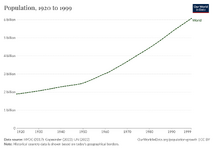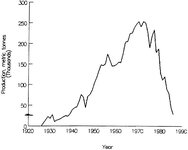[Blah Blah Blah.]
Ignoring the points you can't address without dissonance. How very
intellectual of you.

Overpopulation leads to a wide variety of problems.
For some problems multiplying the population by TEN, magnifies the problem by only NINE or less. For other problems, the magnification will be by ELEVEN or more.
Your laughable strawmen -- problems are ignored unless that multiplication factor is exactly 10.0 -- is "unbecoming" !
I made no such argument; Your accusation that I did is, ironically, itself a strawman argument.
I pointed out that the population of the world is a number that is probably almost completely de-coupled from the amount of leaded fuel burned, and asked you to support your implied assumption that the two are closely linked.
You respond by declaring (incorrectly) that I insist that there's no coupling unless it is a perfect 1:1 coupling - but I did no such thing.
You DO NOT respond by providing a shred of evidence that a close coupling of these two figures exists.
A
quick Google suggests that there were about 100 million cars in the world in 1960; and by 1980 that this had risen to 300 million.
World population in 1960 is estimated at 3 billion; So there was about one car for every 30 humans.
If the world population in 1960 had been only 300 million, the number of people per car
could have been 1:30, implying 1/10 as many cars; But it equally well
could have been 1:3, implying a much wealther world (due perhaps to the supposed boon of low population?).
It all comes down to the question of whether, and how much, low population improves the lives of the people.
Essentially, if the people who didn't exist in our hypothetical population of 300 million 1960ites were the poorest 90%, then the impact on lead pollution of that change in population size would, by simple arithmetic, be zero.
Equally, if the people who didn't exist were the wealthiest 90%, no leaded fuel would be burned at all.
Note that
I seek to DEscribe, not to PREscribe. There is a range of hypotheticals here; From one where population has no beneficial impact on lead pollution, to one in which it has a massive impact.
But note further that there is a clearly proportional relationship between wealth (as proxied by car ownership) and lead pollution.
So we can see that IF low population leads to poverty, then a lower population would have lower lead pollution; and IF low population leads to prosperity, then a lower population would have higher lead pollution.
So, are you going to argue that, if we had fewer people, we would all be so much less affluent; Or do you agree that if we had fewer people, we could still manage to fuck up our environment? Because from where I am sitting, you can't have both affluence and low environmental lead levels, whether with a population size of 3 billion, or of 300 million.
By 1980 there were 300 million cars for a world population of about 4.5 billion, or one car for every 15 people.
In just twenty years of increasing global affluence, the lead pollution per capita approximately doubled.
Given the observed massive variability in this "pollution per capita" number, I reiterate my claim that your assumption that it should be constant (or nearly constant) is
absurd.
I invite you to provide reasoning why your claim
The problem of poisonous lead in the atmosphere was about ten times worse than it would have been with only one-tenth the population.
is NOT absurd; However I will completely understand if you reject my invitation, as it seems to me that to do so would be impossible, unless you are suggesting that
a sharply lower world population would have roughly the same resource use per capita as today's population.
By what mechanism would such resource poverty be achieved? If there are a tenth of the people, each has potential access to ten times as much stuff. If there were ten times as much oil, steel, rubber, etc., why would those things NOT be cheaper, leading to much higher per capita car ownership?
Fewer people => More stuff exists per person => Cheaper stuff => More stuff used per person => Amount of stuff used is
NOT (even approximately) proportional to total population.
The amount of lead pollution is closely linked not to the number of people alive, but to the number of people wealthy enough to own a car. Population reductions would therefore lead to lower lead pollution if
AND ONLY IF population reduction has no benefit to (or is detrimental to) per capita wealth - which seems to be the OPPOSITE of what the advocates of low population are arguing is the case.






